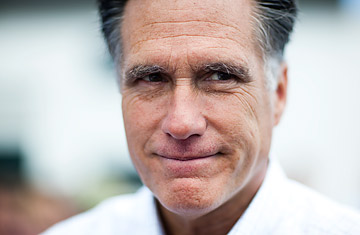
With Iowa's caucuses looming, Romney remains a second choice among many GOP faithful.
(3 of 7)
"What are you going to do about czars?" a woman asked, repeating a Glenn Beck trope about special envoys and advisers whom Obama has added to his staff--a sure sign of creeping socialism (although many of them are now gone). Romney seemed confused by the question and asked the woman what she meant by czars. "I thought at first you were talking about the SARS virus," he said, attempting a joke, perhaps, though no one laughed. He proceeded to answer her question substantively. He believed there was a need for special envoys to deal with overseas diplomatic problems, but having special White House assistants "who manage Cabinet posts doesn't make a lot of sense."
The answer was deft but unsatisfying. Romney seemed not to recognize the Tea Party code: czars is fighting jargon, an anti-Obama rant was being requested, and Romney failed to deliver. The SARS response sent a subliminal message to the base: He isn't really one of us. "He won me over a little bit," a conservative activist named Linda Holub told me after the Sioux City meeting. "But he's still not my candidate. I wonder about his core convictions."
A Constant Opacity
During one of the innumerable, but thoroughly entertaining, Republican debates recently, the CNBC moderator John Harwood asked Romney to defend his multiple, sequential, conflicting positions on the auto bailout. Romney had asked, "Where is Washington?" in 2008, then opposed the Obama bailout, then--when the bailout succeeded--said Obama had pursued the "managed bankruptcy" that he had favored all along. Romney tried, unsuccessfully, to extricate himself from the question, but Harwood persisted, and Romney launched into a much discussed evasion: "I think people understand that I'm a man of steadiness and constancy," he began, citing his 42-year marriage, his Mormon faith and the 25 years he spent at one company, Bain Capital. And then he turned it into an attack: "I think it is outrageous the Obama campaign continues to push this idea."
Romney neglected to mention one additional area of constancy: in his 17-year public career, he has been consistently opaque. Indeed, he has always campaigned as something he probably is not. When he ran for Senator and then governor in Massachusetts, he pretended to be more liberal than he probably was on social issues like abortion and gay rights. Running for President, he has pretended to be more conservative than he actually is on a variety of issues--taxes, health care, the environment, immigration. His one term as governor of Massachusetts probably offers the truest portrait of what he'd be like as President, but he has disavowed his greatest achievement--universal health care--and his interest in being governor waned dramatically as he began to focus on the presidency. "They talk about politicians getting Potomac fever," says Stephen Crosby, dean of the McCormack Graduate School of Policy and Global Studies at UMass Boston. "Romney got Potomac Ebola virus."
